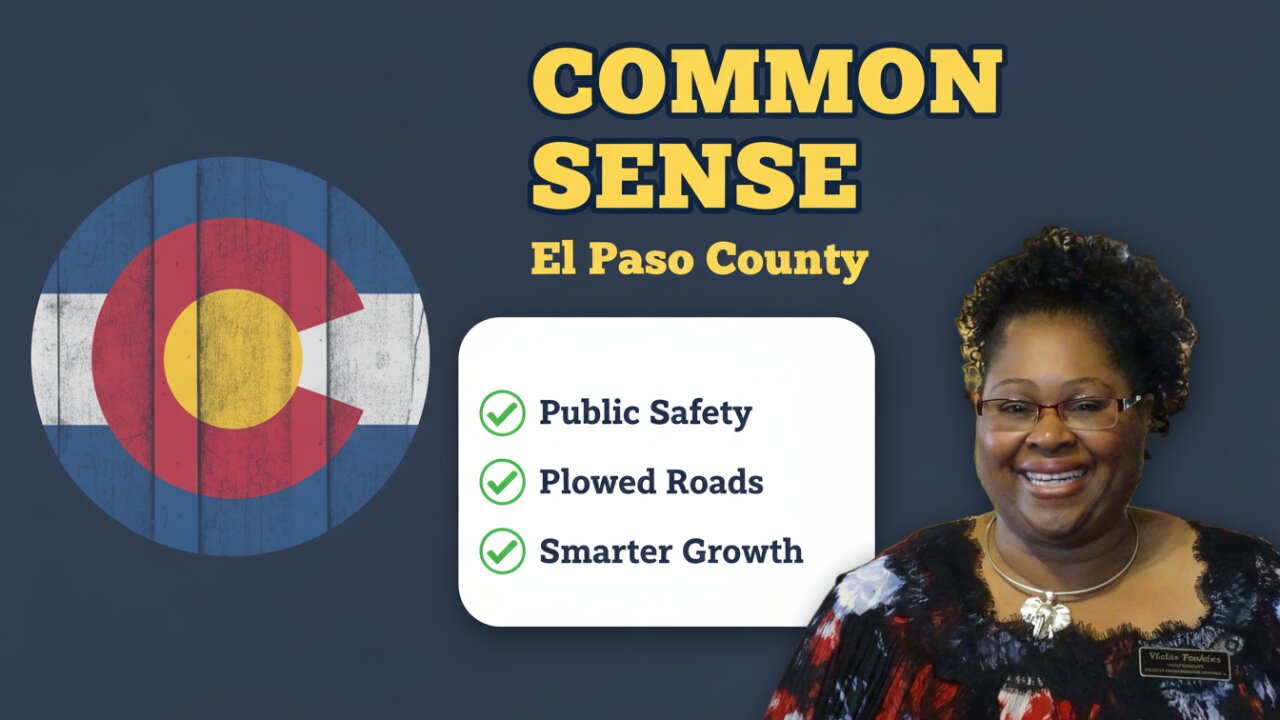Premium Only Content

Make Common Sense Common Again in El Paso County | Vickie Tonkins District 5
El Paso County is changing fast—and not always for the better. In this candid conversation, host Jason sits down with Vickie Tonkins (candidate for County Commissioner, District 5) to talk straight about what’s going right, what’s going wrong, and how we fix the basics: public safety, road maintenance, snow removal, and accountable growth. If you live in Colorado Springs, Monument, Falcon, Black Forest, Security-Widefield, Peyton, or out toward Schriever Space Force Base, this is your backyard and your tax dollars. This episode lays out a practical path for safer neighborhoods and smarter decisions at the county level.
What you’ll hear:
• Why property crime and street disorder are rising—and how simple, local actions reduce break-ins and vandalism
• Neighborhood Watch that actually works: coordinated lighting, clear sightlines, doorbell cameras, rapid text alerts, and small grants targeted to high-risk blocks
• Public safety before politics: prioritizing police, fire, EMS staffing and response times so families, seniors, and small businesses feel secure
• Roads and snow removal: the basics that keep people alive, from winter plowing to filling potholes and keeping emergency routes open
• 82% said NO to the Kármán Line annexation—so why are mega-developments still advancing while basic services lag?
• Smarter growth standards: infrastructure first, transparent cost/benefit analysis, and realistic water, traffic, and public safety plans before a single shovel hits dirt
• Accountability that’s more than a slogan: performance benchmarks, real timelines, open budgets, and public dashboards so residents can track results
Why this matters:
Public safety and core services aren’t partisan—they’re foundational. When roads aren’t plowed, ambulances are delayed. When streetlights are out and neighborhoods are dark, crime finds cover. When growth surges without infrastructure, taxpayers foot the bill with higher costs, longer commutes, and stressed first responders. We can do better by making common sense common again: fix what’s broken, fund what works, and say no to projects that don’t pencil out for the people who live here.
Practical takeaways you can use today:
• Organize a block-level Neighborhood Watch and share a simple checklist: lights on at dusk, trim shrubs near windows, lock vehicles, coordinate camera coverage, and set up group alerts
• Report repeat trouble spots and document response times—use the data to push for targeted patrols and smart resource allocation
• Map unplowed or late-plowed streets in your area; elevate routes critical for seniors, school buses, and medical access
• Engage in growth hearings with specific asks: traffic mitigation, water plans, EMS coverage, school capacity, and road repair schedules with deadlines
What leadership should deliver next:
• A countywide public safety plan with staffing goals, response-time targets, and quarterly progress reports
• A winter operations playbook that prioritizes emergency corridors, school routes, and rural access—published before the first snowfall
• A growth “reality check” policy: infrastructure, water, public safety, and school capacity must be funded and scheduled before approvals advance
• A transparent budget that shows where each dollar goes—roads, plows, deputies, dispatch—so residents can hold leaders accountable
Call to action:
If you want safer neighborhoods and smarter growth in El Paso County, watch, share, and talk to your neighbors. Show up at county meetings. Ask hard questions. Demand timelines and measurable results. This is our home—Colorado Springs, Monument, Falcon, Black Forest, Security-Widefield, Peyton—and the choices we make now will shape it for the next decade. Let’s insist on leadership that delivers the basics: safety, roads, and responsible development that serves the people who already live here.
-
 4:23:32
4:23:32
EricJohnPizzaArtist
1 day agoAwesome Sauce PIZZA ART LIVE Ep. #67: HALLOWEEN SPECIAL tribute to “Need to Breathe”
52.6K10 -
 2:26:26
2:26:26
Nerdrotic
8 hours ago $0.23 earned3I/Atlas : A Cosmic Horror or a New Interstellar Understanding? | Forbidden Frontier #122
200K17 -
 54:56
54:56
Sarah Westall
6 hours agoHidden Biblical Writings: Evidence Based Investigation, Worlds First Collection w/ Matthew McWhorter
26.6K18 -
 3:08:48
3:08:48
megimu32
5 hours agoOTS: Great Scott! How Back to the Future Changed Movies Forever
28.3K9 -
 3:40:15
3:40:15
CassaiyanGaming
4 hours ago🟢LIVE - The OUTLAST Trials with JahBless & CatDog
20.2K4 -
 10:54
10:54
Nate The Lawyer
2 days ago $0.67 earnedNEW Charges & Lawsuit For Fake Doctor Illegal Who Ran Schools For Decades
47.3K36 -
 2:34:44
2:34:44
Joker Effect
4 hours agoSTREAMER NEWS: Adin Ross, LupLupka, SideScrollers, N3on, TrainwrecksTv, Cuffem, WestCol, BottedWTF.
20.5K9 -
 3:04:40
3:04:40
IsaiahLCarter
1 day ago $0.19 earnedWill New York City Choose Communism? || APOSTATE RADIO 032 (with John D. Macari)
28.4K10 -
 2:31:41
2:31:41
Illyes Jr Gaming
7 hours agoRetro Sports Game Night NHL 94
10.1K4 -
 1:22:31
1:22:31
HELMETFIRE
4 hours ago🟢GAMING WITH FIRE EP14🟢
7.11K12